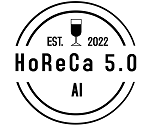HoReCa5.0 Project - Stakeholders Feedback Survey

Information and Consent
Target responders:
- HoReCa sector businesses' owners, professionals and self-employed people
- Relevant professional networks (Associations and umbrella organisations of businesses and professionals in the HoReCa sector)
Thank you for choosing to allocate your time to participate in this survey, which is undertaken in the framework of the Erasmus+ HoReCa5.0 project (Enabling SMEs in the HoReCa sector for the effective adoption of Artificial Intelligence knowledge and tools – HoReCa5.0 – 2022-I-BG0I-KA220-VET-000089399).
For your participation in this survey, you will be asked to give some data and information, which will be processed in accordance with the EU GDPR requirements, as well as in accordance with the project's policies on ethics and data management. Data protection is a top priority in the HoReCa5.0 project and in the interest of the project's objectives and expected results.
Participation is voluntary. Your responses are confidential and will only be used for the purposes of the survey. You will be informed of the availability of the project results through the subsequent HoReCa5.0 project dissemination and communication activities.
Please, read the Data Protection Notice and provide your explicit consent before moving to the survey content.
Glossary:
- Artificial Intelligence (AI): the theory and development of machines that are able to perform tasks normally requiring human intelligence, i.e., collection of information, reasoning, learning, and adapting to environment. Various technologies are associated with these tasks, such as visual perception, speech recognition, identification of patterns, decision-making, mathematical modelling, machine learning, semantic reasoning, etc.
- Machine Learning (ML): a subfield of AI that deals with systems that are able to acquire their own 'knowledge' by extracting patterns from data instead of having those patterns provided to them directly via programming.
- Information representation and reasoning: a subfield of AI dedicated to representing information about the world in a form that a computer system can use to solve complex tasks such as diagnosing a medical condition or having a dialog in a natural language.
Data analytics: Data analytics is the science of analysing raw data to make conclusions about pieces of information they convey.
- Virtual Reality (VR): Virtual reality is the use of computer technology to create simulated environments that implement realistic scenarios and use-cases.
- Augmented Reality (AR): Augmented reality is an interactive experience that combines the real world and computer-generated (virtual) content. The content can span multiple sensory modalities, including visual, auditory, haptic, somatosensory (perception of touch, as well as temperature, body position, and pain) and olfactory (sense of smell).
- Internet of Things (IoT): The Internet of things describes the interconnection via the internet of computing devices embedded in everyday things, physical objects with sensors, processing ability, software and other technologies, enabling them to send and receive data with other devices and systems over the Internet or other communications networks.
The survey requires approximately 15-20 minutes to be completed.
The European Commission's support for the production of this publication does not constitute an endorsement of the contents, which reflect the views only of the authors, and the Commission cannot be held responsible for any use which may be made of the information contained therein.





